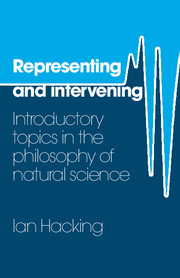Book contents
- Frontmatter
- Acknowledgements
- Contents
- Analytical table of contents
- Preface
- Introduction: Rationality
- Part A Representing
- Part B Intervening
- 9 Experiment
- 10 Observation
- 11 Microscopes
- 12 Speculation, calculation, models, approximations
- 13 The creation of phenomena
- 14 Measurement
- 15 Baconian topics
- 16 Experimentation and scientific realism
- Further reading
- Index
- Frontmatter
- Acknowledgements
- Contents
- Analytical table of contents
- Preface
- Introduction: Rationality
- Part A Representing
- Part B Intervening
- 9 Experiment
- 10 Observation
- 11 Microscopes
- 12 Speculation, calculation, models, approximations
- 13 The creation of phenomena
- 14 Measurement
- 15 Baconian topics
- 16 Experimentation and scientific realism
- Further reading
- Index
Summary
Francis Bacon (1560–1626) was the first philosopher of experimental science. Although he made no contribution to scientific knowledge, many of his methodological ideas are still with us. ‘Crucial experiment’ is an example.
He was a courtier born into the long reign of Elizabeth I. (‘Being asked by the queen how old he was, he answered with much discretion, being then but a boy, That he was two years younger than Her Majesty's happy reign.’) He was the leading prosecuting attorney of his day, prosecuting ‘criminal and capital alike’. (‘He was never of an insulting and domineering nature over them, but always tender-hearted, … as one that looked upon the example with the eye of severity, but upon the person with the eye of pity and compassion.’) He took bribes and was caught. (‘I was the justest judge that was in England these 50 years: but it was the justest censure in Parliament these 200 years.’)
He saw that observation of nature teaches less than experiment. (‘The secrets of nature reveal themselves more readily under the vexation of art than when they go their own way.’) He was something of a pragmatist. (‘Truth therefore and utility are here the very same things, and works themselves are of greater value as pledges of truth than as contributing to the comforts of life.’) He told us to experiment in order to ‘shake out the folds of nature’.
Information
- Type
- Chapter
- Information
- Representing and InterveningIntroductory Topics in the Philosophy of Natural Science, pp. 246 - 261Publisher: Cambridge University PressPrint publication year: 1983
Accessibility standard: Unknown
Why this information is here
This section outlines the accessibility features of this content - including support for screen readers, full keyboard navigation and high-contrast display options. This may not be relevant for you.Accessibility Information
- 1
- Cited by
